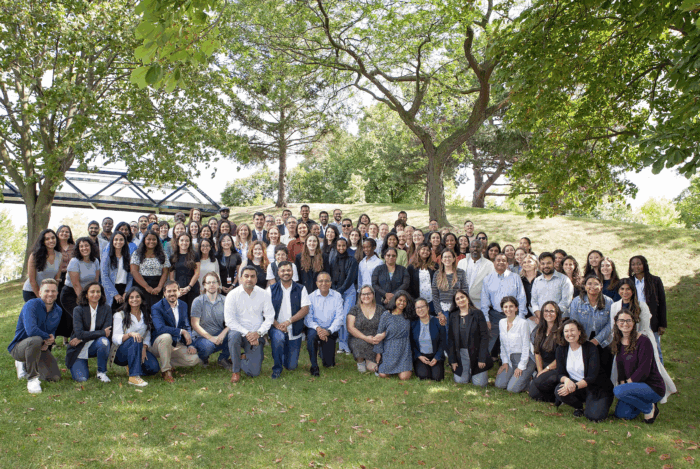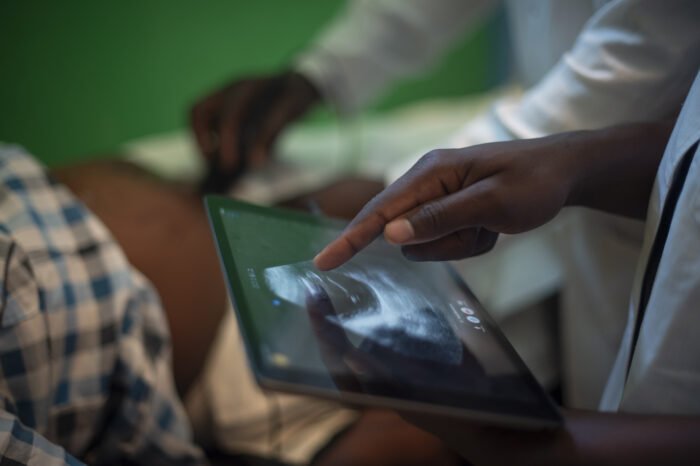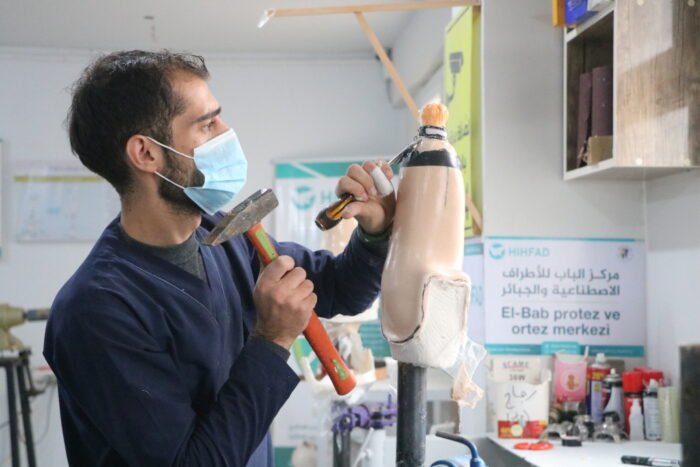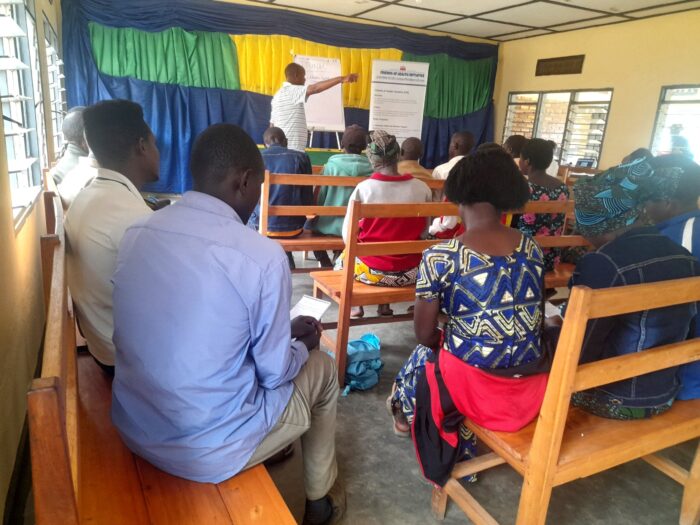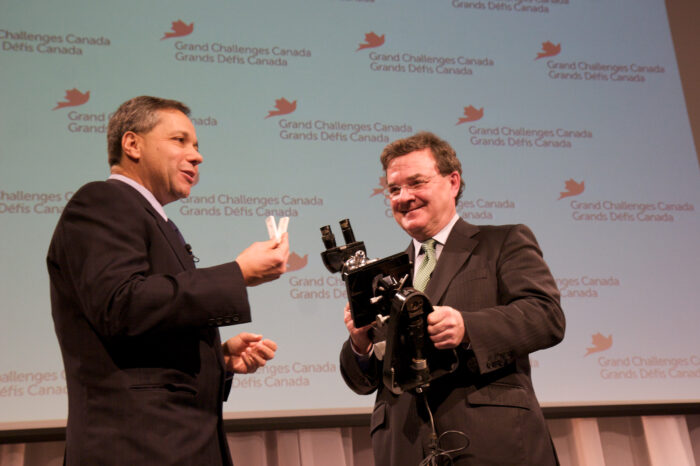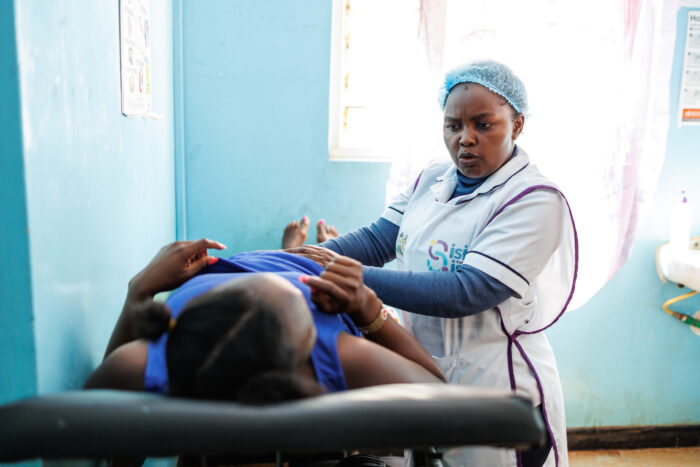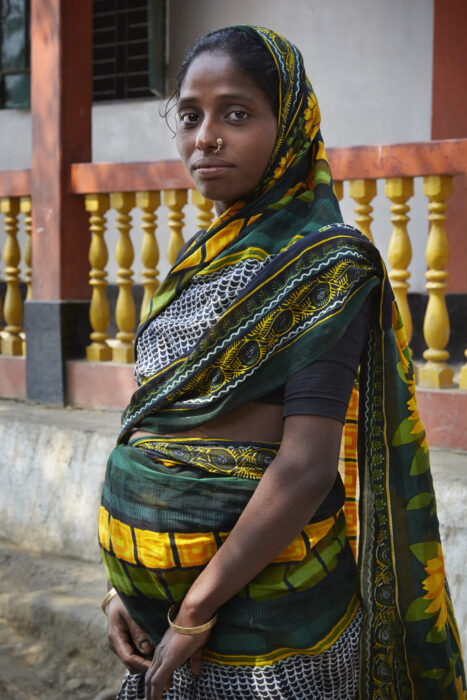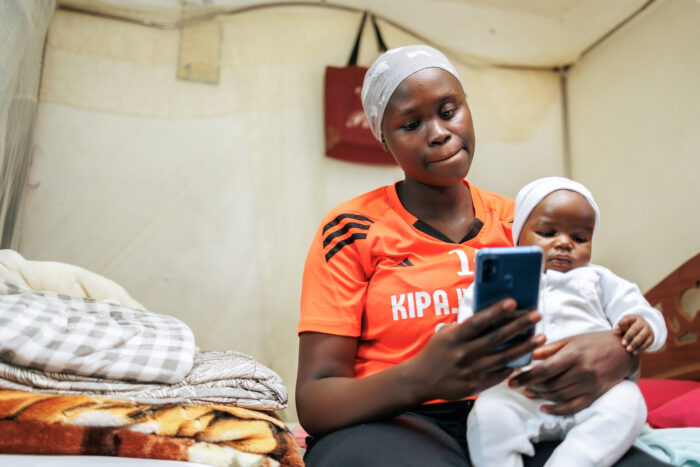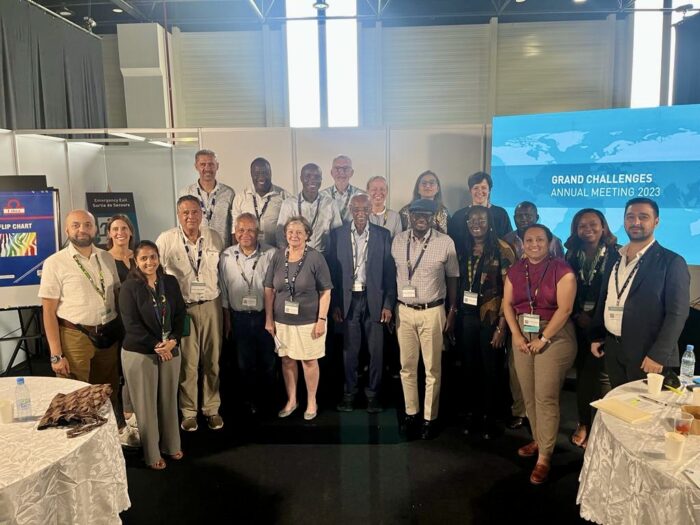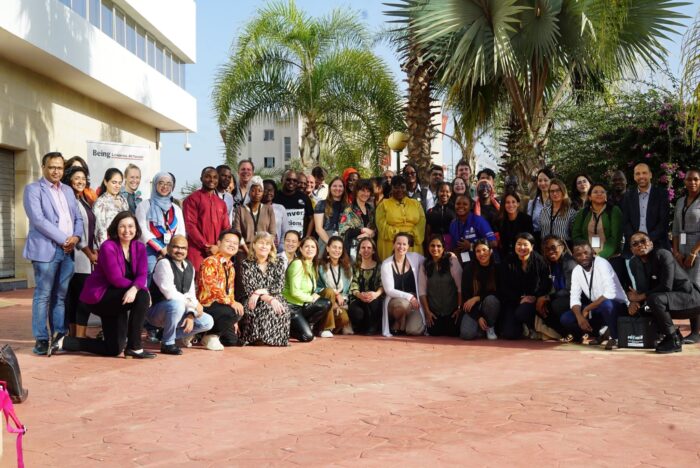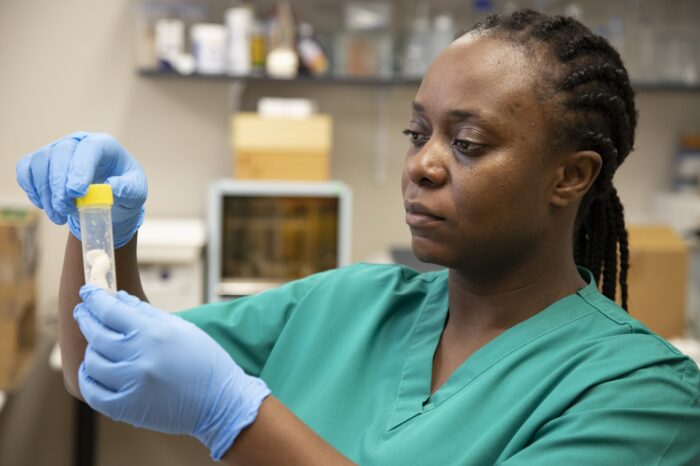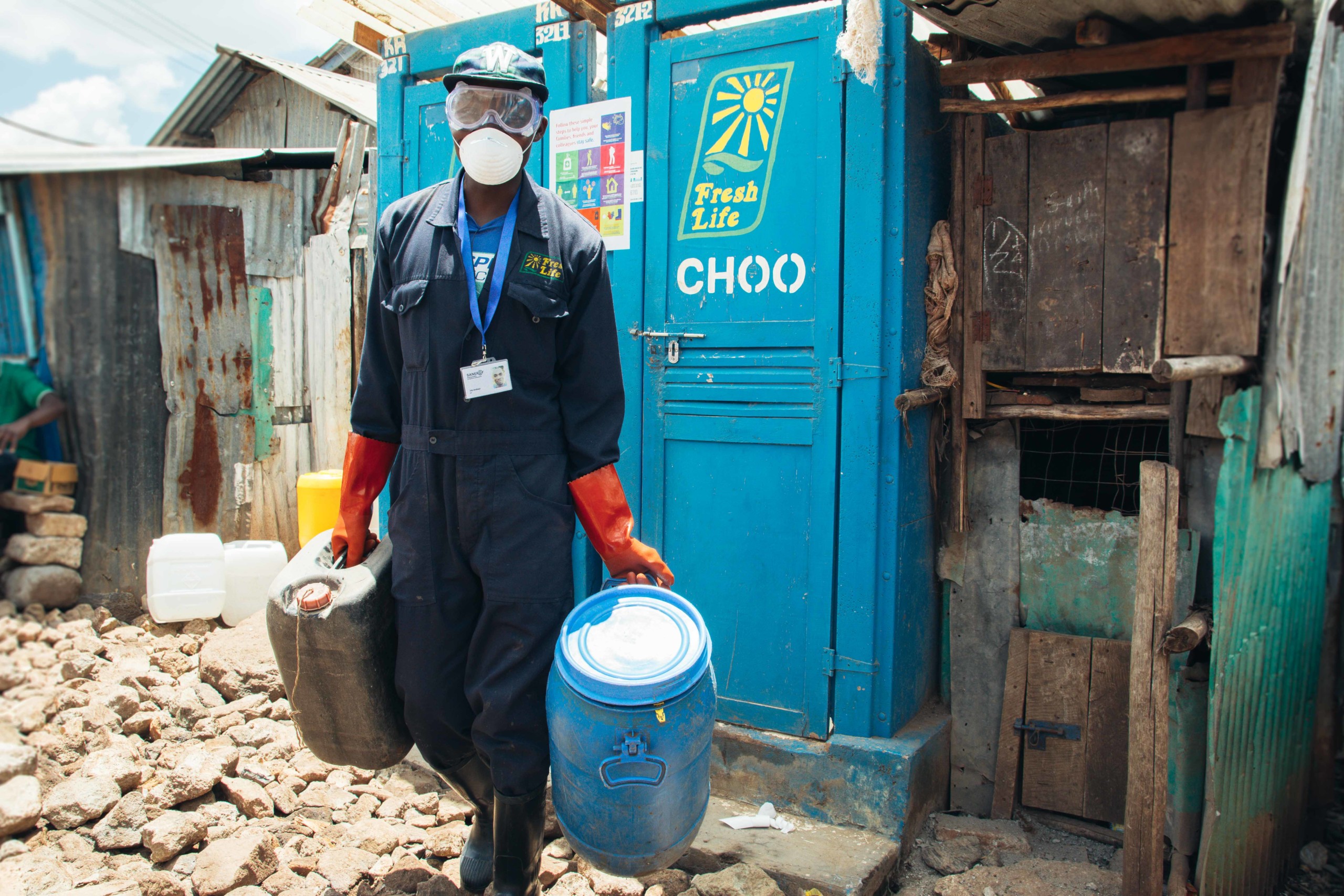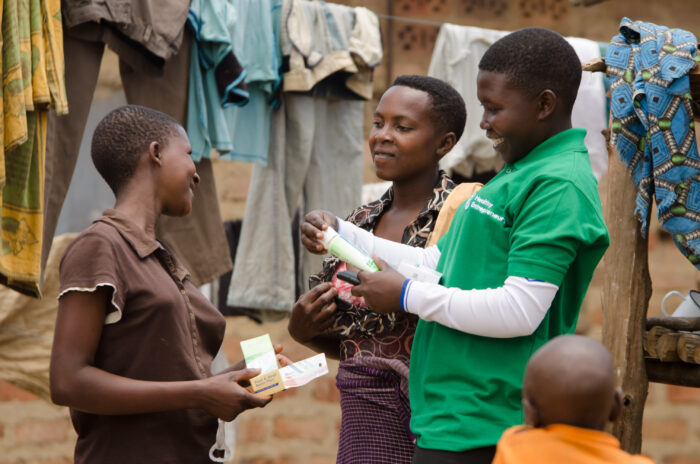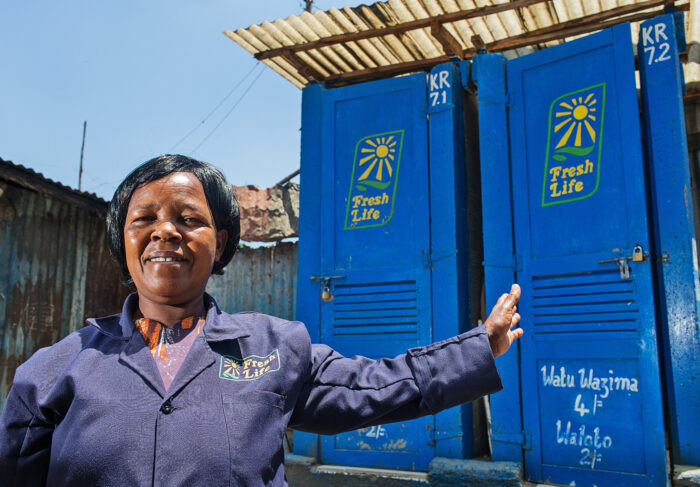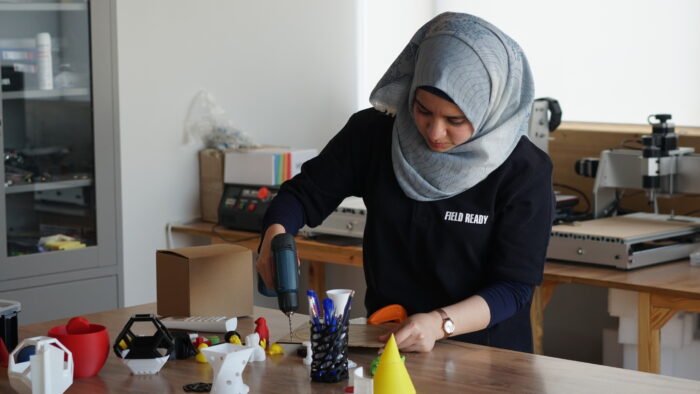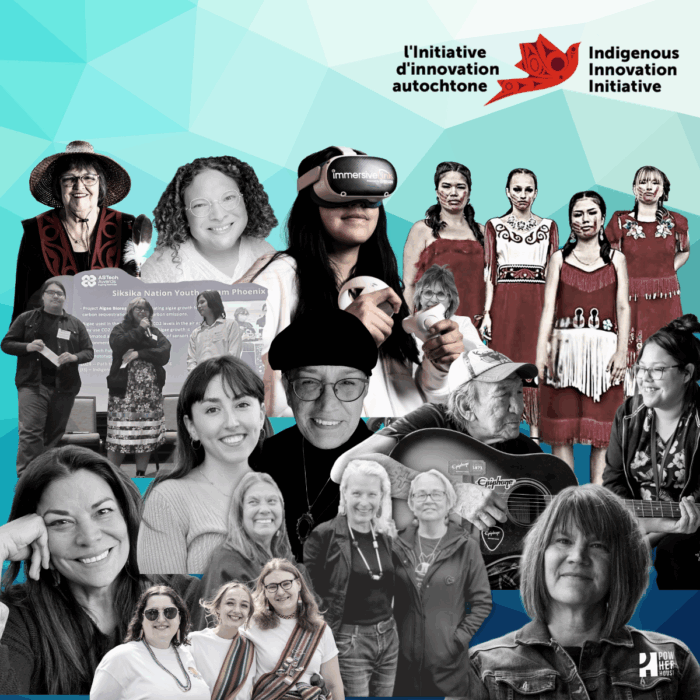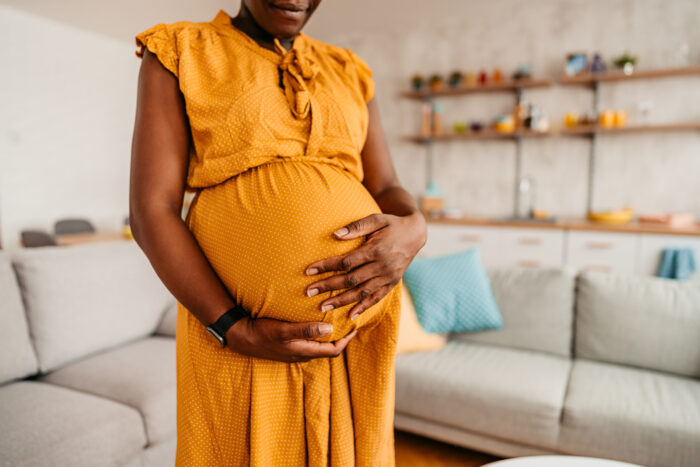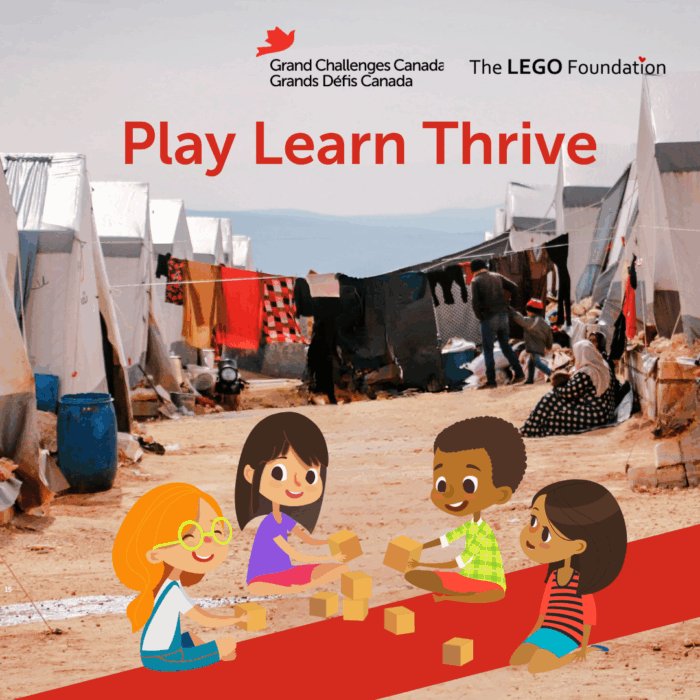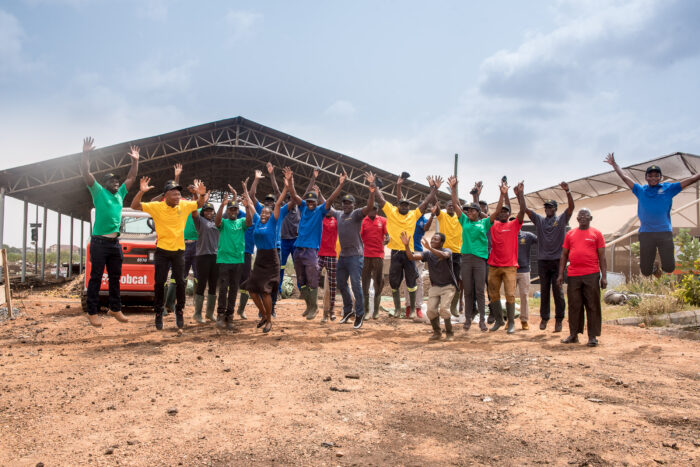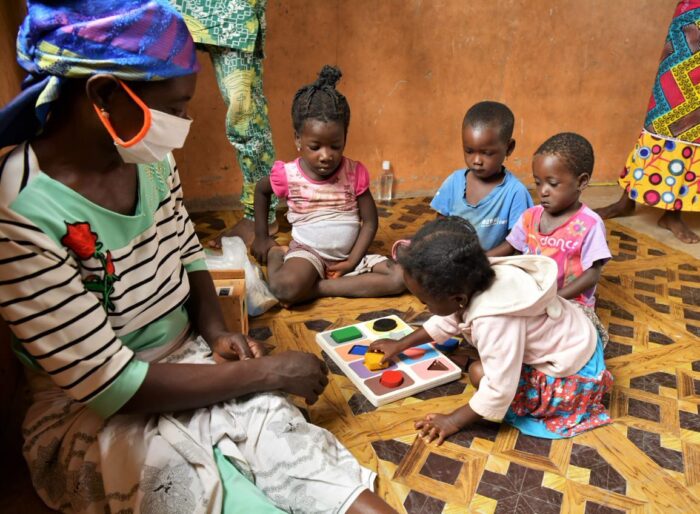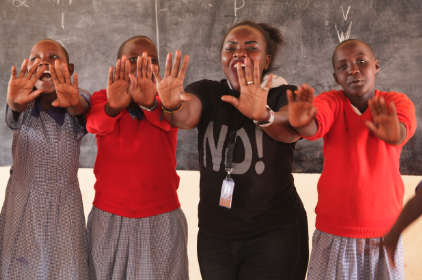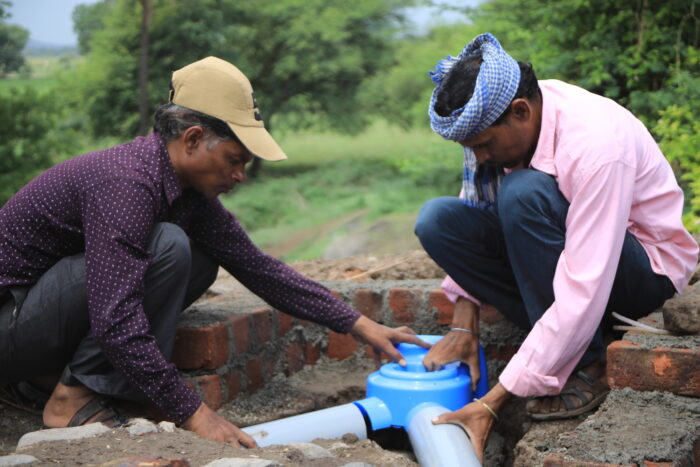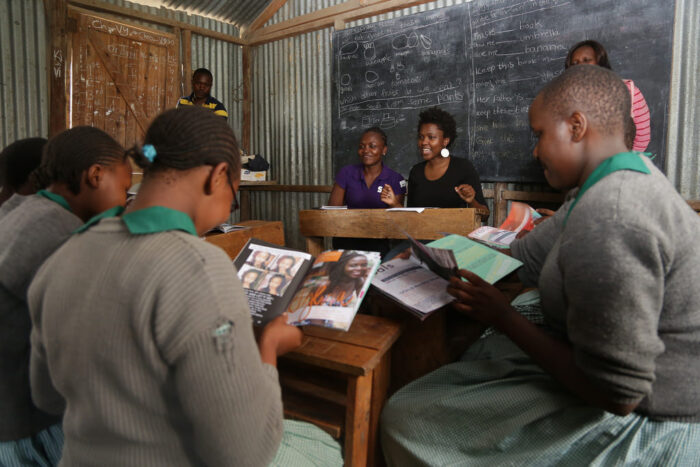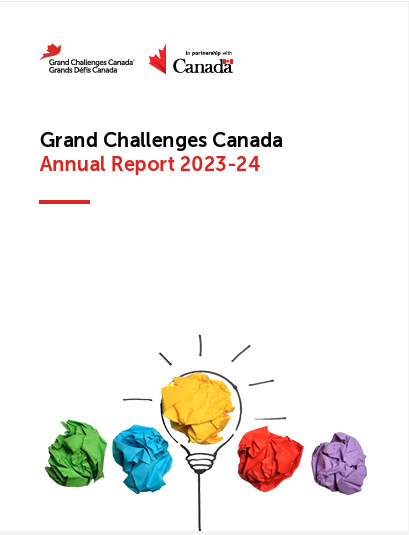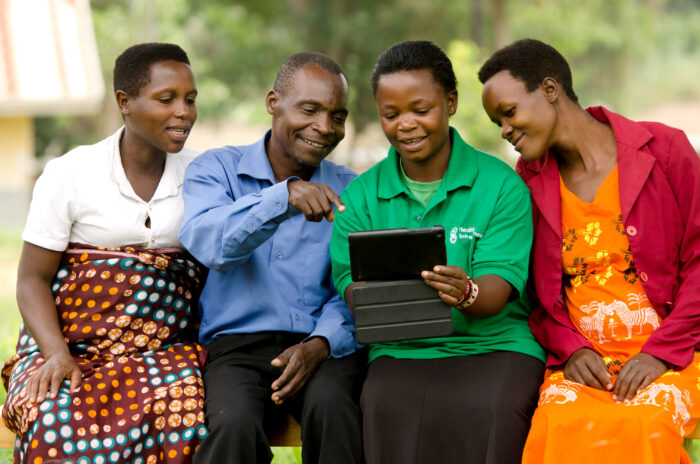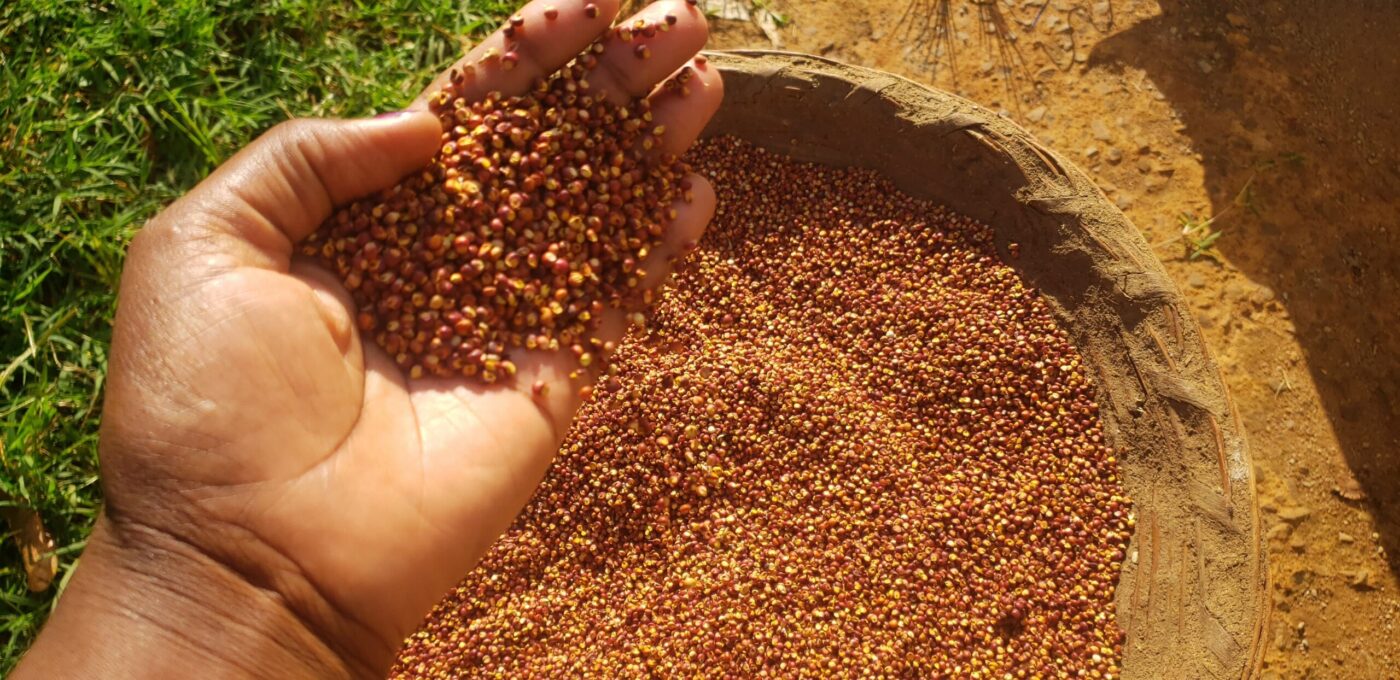Climate change threatens to roll back many of the gains that we’ve made in global health. In 2022, with support from the Government of Canada and in partnership with the South African Medical Research Council, we put out a call for funding, seeking bold ideas to address the impact of climate change on health.
After a thorough peer-review process, we selected 42 innovations that are working to address the impact of climate change on a variety of areas — from infectious disease and mental health to nutrition, heat stress, food security and beyond. These innovations received a collective $6.3M CAD in seed funding and have now progressed to the pilot-testing phase.
Get to know the innovations in our Stars in Global Health Climate x Health portfolio:
Bridge to Health Medical and Dental
Using Point-of-Care Ultrasound (POCUS) to Mitigate the Impact of Dengue Fever in Peru
Canada & Peru | Communicable diseases | Vector-borne disease threats
Dengue fever is a mosquito-borne viral infection causing severe flu-like symptoms and can develop into a potentially fatal complication called severe dengue. With this innovation, Bridge to Health Medical and Dental will use portable ultrasound technology and training local healthcare professionals to prevent severe illness and complications with dengue fever in remote areas of Peru. Detecting dengue early allows for timely treatment, prevents severe illness, reduces disease spread, enables an effective public health response, and lessens the burden on healthcare systems. Bridge to Health will train local healthcare professionals by connecting them to an online network of ultrasound practitioners to detect and manage dengue outbreaks in remote and resource-limited settings. In addition to testing nearly 500 patients for suspected dengue fever, the project seeks to educate local communities on preventative measures and when to seek care.
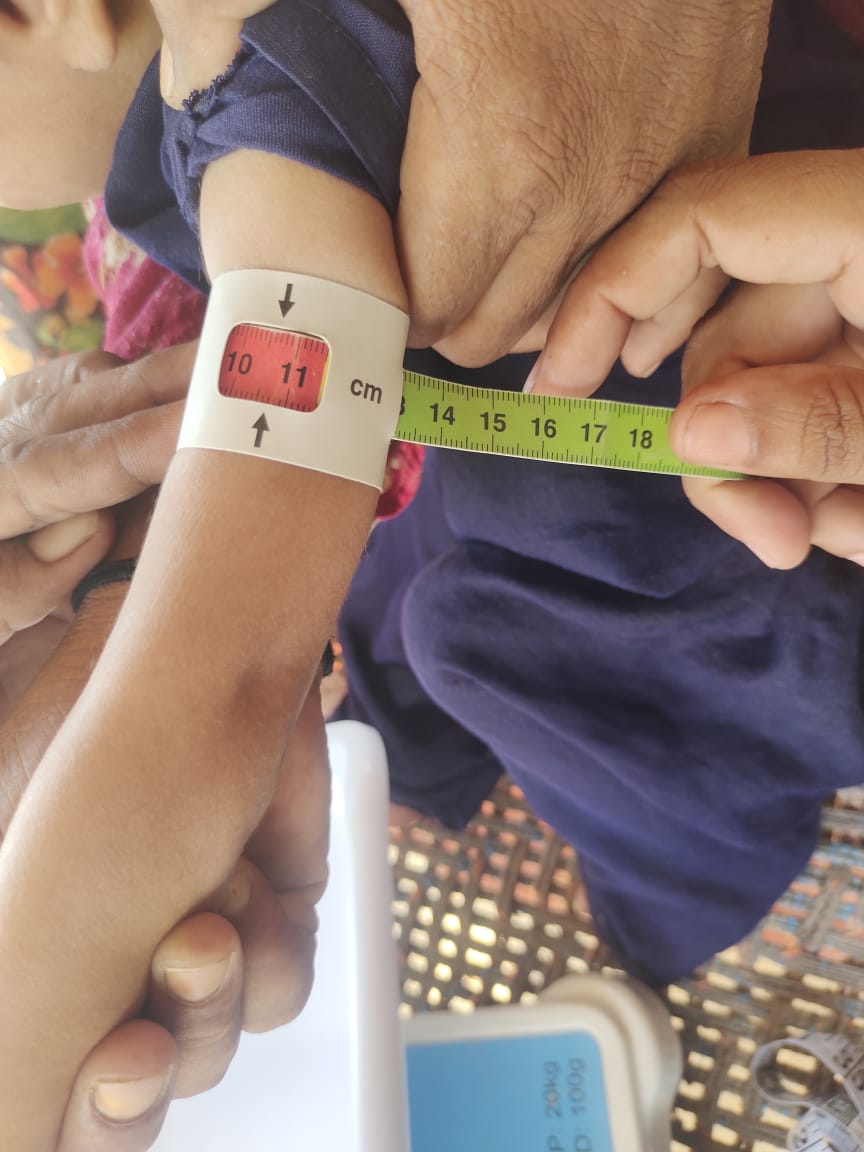
The Hospital for Sick Children (SickKids)
Mental Health Supports for Communities Affected by Climate Change
Canada & Pakistan | Mental & psychological health | D amage to infrastructure & health services
In areas affected by extreme weather events due to climate change, mental health needs are often underserved and go undetected. In flood-affected areas of Pakistan, many women, children, and their families are displaced and undergo significant distress. In response, The Hospital for Sick Children (Sick Kids) and Aga Khan University (AKU) have partnered to develop and test a training package for community health workers dedicated to provide mental health screening, referral and support, alongside strategies for building resilience to climate change-related extreme events in the future. The pilot cohort of 20 community health workers aims to reach over 2000 women and their families, equipping them with the knowledge to recognize and address the consequences of climate change on mental health.
Giusta Health Foundation
Mobile App Responding to Water-Borne Diseases
Nigeria | Communicable diseases | Migration and displacement
In Nigeria, flooding and extreme rainfall due to climate change have caused widespread devastation and increased transmission of infectious diseases. The Giusta Health Foundation aims to develop a mobile app that improves emergency response preparedness for the spread of water-borne diseases in flood-prone areas and along migration routes of displaced persons. The app will help surveillance teams at State Ministries of Health to predict areas of disease spread in the event of an outbreak, and plan resource allocation and interventions in real-time for communities that have been displaced due to flooding. Additionally, it will allow users to find nearby health facilities, camps or shelters where they can access help during flood events. The data generated from this app will also facilitate advocacy for integrating climate change awareness in the health sector.
OffGridBox Rwanda
Installing Power and Water Purification Modules in 4 Local Health Centres
Rwanda | Communicable diseases | Water-borne disease threats
In Rwanda, climate change is exacerbating water-related challenges, from drought to extreme flooding. In rural areas where access to clean water is limited, communities face risks of transmissible disease and water-borne illness. OffGridBox Rwanda partnered with Society for Family Health (SFH) to reduce the prevalence of water-borne disease by manufacturing and installing modular power and water purification solutions in rural health centres. Through these purification systems, clinics and patients will be provided free water and power for medical equipment. Excess water and power will be sold to the surrounding community, further reducing the incidence of disease and creating a sustainable business model.
The International Centre of Insect Physiology and Ecology (ICIPE)
Using Open Data Kit Software and AI to Predict the Spread of Visceral Leishmaniasis
Kenya | Communicable diseases | Vector-borne disease threats
Visceral Leishmaniasis (VL) is a vector-borne disease spread by infected sandflies. The disease occurs most often in East Africa, Brazil and India, and is fatal if left untreated in over 95% of cases. VL poses a serious threat and is becoming increasingly difficult to address in the context of climate change. To better manage and prevent outbreaks of the disease, Kenya’s Ministry of Health worked in partnership with other healthcare institutions to keep a record of cases. The data is centrally stored in the International Centre of Insect Physiology and Ecology (ICIPE)’s Open Data Kit software. ICIPE aims to create a digital advisory system that uses existing data in combination with artificial intelligence to develop an early warning system for potential VL outbreaks across Kenya. Kenya’s Ministry of Health uses ICIPE’s predictive model to contribute to prepare for and control visceral leishmaniasis outbreaks, in order to alleviate the burden of disease on marginalized and rural communities.
Joelex Uganda Limited
Water ATMs for Safe Drinking Water in Uganda
Uganda | Communicable diseases | Water security (quantity and quality)
Climate change, flooding and rising temperatures threaten the already limited access to clean water in Uganda. The Joelex team is implementing an innovation to combat the risks associated with having low access to potable water by constructing solar-powered Public Water ATM facilities in accessible places so that people can have access to safe drinking water on demand. By putting the Water ATMs in markets, hospitals, schools, and residential communities, Joelex aims to provide potable water to vulnerable communities, prevent the spread of water-borne disease and mitigating the effects of climate change while using sustainable business practices.
Charitable Analytics International (CAI)
Food Distribution Centre Monitoring System
Canada & Kenya | Malnutrition & undernutrition | Nutrition security
As climate change increases the frequency and intensity of droughts in Kenya, the country is experiencing challenges in raising livestock and decreasing crop yields. Though current food distribution programs are in place, they fail to address the ever-changing consumer demand of food products due to the evolving effects of climate change on food accessibility. Charitable Analytics International (CAI) is deploying a monitoring system that provides up-to-date information about the stock levels of products in food distribution centres to equip users and decision-makers with the information needed to reduce disruptions and respond to the changing needs of communities affected by drought.
Obafemi Awolowo University, ILE – IFE –
Using Biofilters to Improve Respiratory Health
Nigeria | Respiratory illness | Air quality
In Nigeria, the effects of climate change on indoor air quality have contributed to worsening respiratory and overall health. As available remedies for poor household air quality remain inaccessible for most people, the team at Obafemi Awolowo University are developing a low-cost, eco- and user-friendly biofilter device to mitigate the impact of climate change on indoor air quality with the goal of improving respiratory health. In addition, the project will educate health workers and local students on the risks of air pollution on respiratory health.
Associação Sekeleca U Phatima (ASUPHA)
Emotional Education Toolkit for Communities Affected by Climate Change-Related Devastation
Mozambique | Mental & psychological health | Extreme weather
Many regions of Mozambique are vulnerable to extreme weather events such as droughts, heat, cyclones, and heavy rain associated with climate change. These devastating weather events ultimately affect the mental health and wellbeing of local communities, but the lack of resources and support for those suffering from poor mental health makes it difficult for individuals to recover from climate change-related setbacks. In response, Associação Sekeleca U Phatima (ASUPHA) is working with specialists, psychologists, and counsellors to develop an Emotional Education Toolkit to improve mental and emotional health in communities affected by severe weather. ASUPHA will also coordinate group therapy and peer-to-peer support networks to strengthen community resilience.
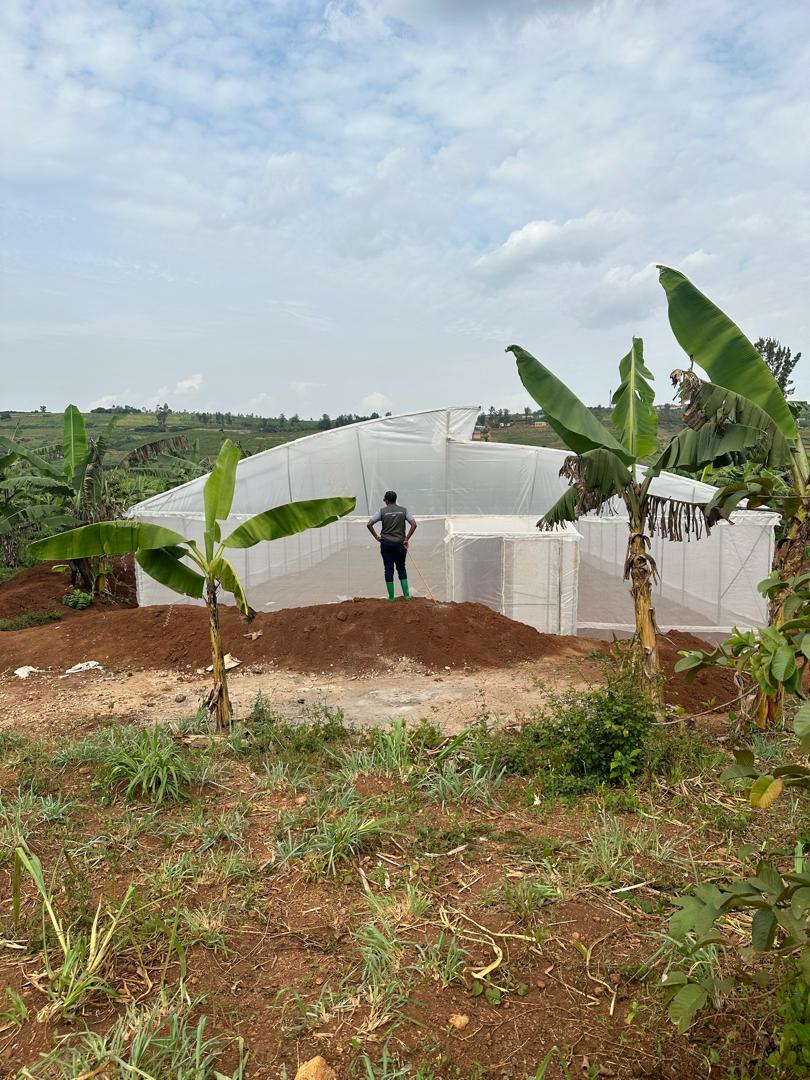
Health Research and Services Solution (HRSS)
Using Aeroponic Systems to Improve Adapt Agricultural Practices in Indigenous Communities
Rwanda | Malnutrition & undernutrition | Nutrition security
Rwanda’s Indigenous population depends primarily on household agriculture to access food. However, the effects of climate change have reduced rainy seasons and increased temperatures, leading to serious health issues in Indigenous communities such as undernourishment, food insecurity, and child stunting. To improve agricultural yields for Indigenous Rwandans, Health Research and Services Solution (HRSS) seeks to introduce aeroponic systems (greenhouses) that will be managed by community co-operatives. HRSS will also provide training on crop cultivation and harvesting, greenhouse management techniques, as well as food preparation classes to improve community-wide food security and alleviate malnutrition
AIDS Widow and Orphans’ Education Support Organization (AWOESO)
Community-Based Water Infrastructure in South Sudan
South Sudan | Communicable diseases | Water security (quantity and quality)
In South Sudan, climate change has worsened water access, safety and quality, leading to an increase in water- and sanitation-related diseases. AWOESO aims to mitigate the effects of climate change on access to clean water by rehabilitating 10 water access points, training 70 community-based water pump mechanics, and establishing a volunteer water management committee. In addition, AWOESO will train community members on climate resilience strategies, as well as on water hygiene and sanitation. This community-led commitment to clean drinking water will allow individuals to be engaged in the implementation, monitoring, and decision-making of their water facilities, ultimately fostering autonomy and health improvements in the face of climate change-based hardships.
Marondera University of Agricultural Sciences and Technology
Community Recovery Groups for Climate Change-Affected Communities
South Africa & Zimbabwe | Mental & psychological health | Extreme weather
While Southern Africa has seen a rise in climate-induced disasters, most restoration efforts have focused on infrastructure and livelihoods, neglecting mental health impacts. With the use of Community Recovery Groups (CRGs), Marondera University of Agricultural Sciences and Technology aims to support survivors through social networks, counseling, and shared storytelling in South Africa and Zimbabwe. Led by trained Village Health Workers, each CRG will have access to mental health and business skill-building modules. These groups will create resilience and build complimentary skills to allow communities affected by climate change to heal.
Centre Pasteur du Cameroun (CPC)
Preventing the Spread of Mosquito-Transmitted Pathogens Via Trapping and Prediction
Cameroon | Communicable diseases | Vector-borne disease threats
Rising temperatures and flooding caused by climate change, coupled with unplanned urbanization, lead to the spread of mosquitoes and vector-borne disease. A team of public health specialists from the Centre Pasteur du Cameroun will test the effectiveness of the surveillance system, which has been developed to detect mosquito-transmitted pathogens directly from mosquitoes’ expelled saliva. This innovative surveillance system will enable early detection of pathogens at a stage when they can be contained, before they infect humans. The goal of the innovation is to enable communities in Cameroon to receive early warnings of mosquito-transmitted pathogens and to respond to potential outbreaks before they spread.

Laboratoire Industriel d’Alternatives Vétérinaires (LIAV)
Reducing Water-Borne Illness Through Rapid Testing and Natural Cleaning
Morocco | Communicable diseases | Water security (quantity and quality)
Climate change has resulted in declining rainfall in Morocco and throughout sub-Saharan Africa, causing critical sources of drinking water to dry up. Those living in rural communities are often forced to travel kilometres away on foot to source drinking water, storing it for long periods of time in jerry cans, and in doing so, create an environment for microbes to grow and water-borne diseases to spread. Laboratoire Industriel d’Alternatives Vétérinaires (LIAV)’s innovation consists of two elements: a rapid diagnostic testing kit for water containers, and a natural anti-microbial cleaning solution that slows microbial growth. LIAV’s testing kit and solution will allow for the transportation of clean water and reduction in the transmission of water-borne illness in target regions of Morocco where safe drinking water is scarce.
Association Tchad Plus
Fighting Parasitic Infections with DAWA Mobile Health
Chad | Communicable diseases | Vector-borne disease threats
In Chad, safe drinking water sources like Lake Chad are drying up because of climate change-induced droughts. As water scarcity increases, many people are forced to use unsafe water sources that harbour parasites and other infectious diseases. Parasitic infections are often left untreated as medical care is either too costly, inaccessible, or complicated to obtain. The Chad Plus Team seeks to make healthcare accessible by bringing it directly to populations with their DAWA Mobile Health initiative, a network-based solution that will complement existing healthcare infrastructure by using mobile lab tests, diagnostic services, awareness-building, and medication delivery for remote communities.
The Aga Khan University
Faircap Family Water Filters for Reducing the Instance of Water-Borne Illness and Malnutrition
Pakistan | Communicable disease | Water-borne disease threats
Pakistan is among the countries most affected by climate change, according to the World Food Program USA. Access to safe drinking water is limited due to high levels of flooding, resulting in infections that can increase the rate of malnutrition in children. The Aga Khan University’s innovation, Faircap Family water filters, aims to improve drinking water quality for household use. Faircap Family filters are easy-to-use, low-cost, and can be adapted to existing water containers to eliminate dirt and microbes that cause gastrointestinal disease. The filters will be tested for bacterial and viral protection, as well as cost-effectiveness. Faircap Family filters stand as a promising solution to prevent water-borne illnesses, improve nutrient absorption, and reduce malnutrition.
Bangabandhu Sheikh Mujib Medical University (BSMMU)
Mental Health Social Network and App
Bangladesh | Mental & psychological health | Migration and displacement
Bangladesh’s coastal areas are highly vulnerable to rising sea levels, salt intrusions, and frequent disasters such as cyclones and floods, which can have a significant negative impact on the mental health and well-being of coastal populations. Bangabandhu Sheikh Mujib Medical University (BSMMU)’s team aims to establish a community emotional intelligence network in these affected areas to aid eco-anxiety and distress caused by natural disasters, displacement, and migration. The team will collaborate with trained community volunteers to form a network of mental health resources to enhance community resilience after future climate change events. This network and its resources – including audio clips, videos, user contact, mental health supports, and access to specialized mental health services — will be facilitated and accessible through a dedicated mobile app.
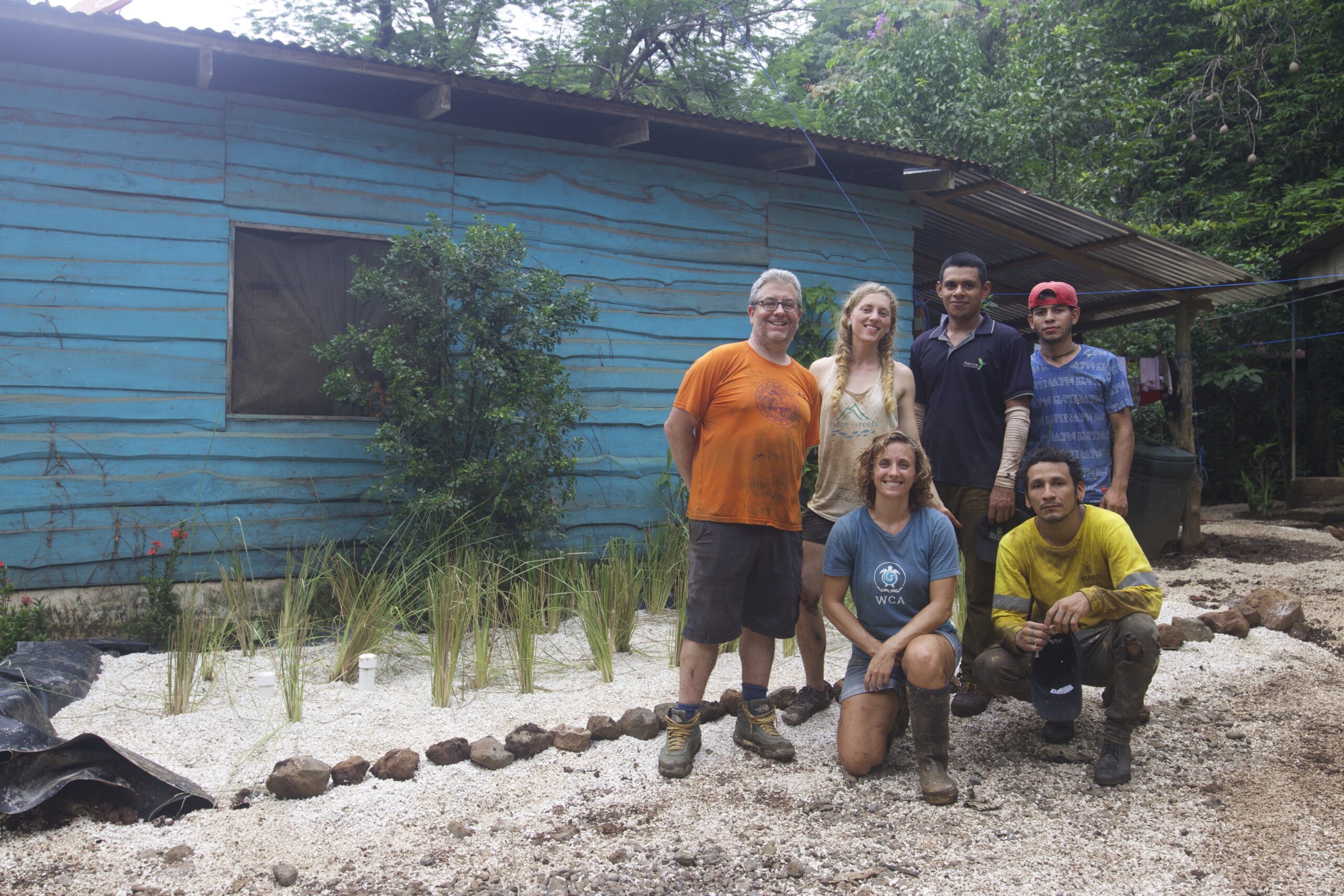
Asociación para la Conservación de Vida Silvestre y Marina
Nature-Based, Low-Cost Wastewater Treatment Solutions
Costa Rica | Communicable Diseases | Water-borne disease threats
Rising sea levels from climate change and increasing urbanization create an elevated risk for wastewater contamination of surface waters and water-born illnesses in Costa Rica. The Wildlife Conservation Association has partnered with Ridge to Reefs to implement innovative plant-based wastewater treatment and composting systems — the Bioreactor Garden — with the aim to test their effectiveness in providing low-cost, low-tech, climate resilient and locally appropriate solutions to reduce wastewater contamination that results in water-borne diseases in Nosara, Costa Rica.

Ndaloh Heritage Organization
Food-to-Food Fortification
Kenya | Malnutrition & undernutrition | Nutrition security
The effects of climate change in Kenya manifest as frequent droughts, unreliable rainfall, and low crop yield that leads to food insecurity and malnutrition. Ndaloh Heritage Organization’s initiative supports small farmers to produce fortified flour and porridge using readily available local perishable crops such as guava, mango, and amaranth leaves. By increasing mineral and vitamin content in staple foods, this innovation aims to improve food security, support smallholder farmers, and decrease malnutrition.
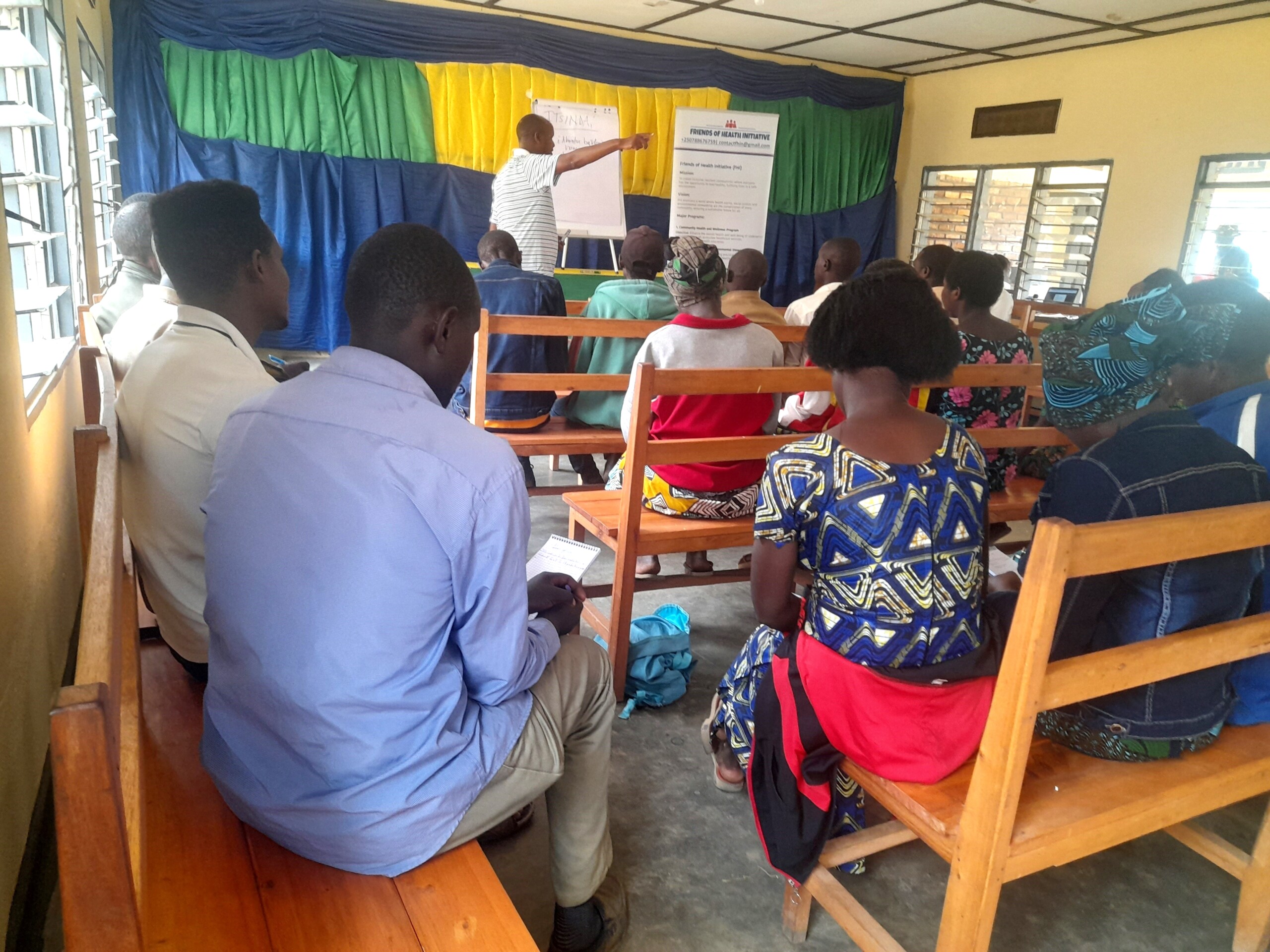
Friends of Health Initiative
Self-Made Compost Encourages Subsistence Farming to Combat Food Insecurity
Rwanda | Malnutrition & undernutrition | Water quantity and quality
Water scarcity is a significant climate risk for Rwanda’s rain-fed farming communities, particularly for small and marginal farmers. Most Rwandans depend on traditional agricultural practices. However, many have faced new challenges due to climate change-related disturbances in rainfall patterns and long-term temperatures, and the frequency of extreme weather events. The Friends of Health Initiative will provide access to organic fertilizer, agricultural water, and technical assistance in environmentally friendly farming methods to help food-insecure families in achieve food security and adequate nutrition. The Friends of Health Initiative’s system aims to extract agricultural water and compost from discarded banana stems to grow a variety of plant crops in greenhouse farms, increasing access to nutritious food and reducing malnutrition during droughts. The initiative will provide training to women on how to install and manage the agricultural water and compost harvesting system, as well as how natural wastes can be useful and repurposed as an alternate water resource. Through this innovation, The Friends of Health Initiative seeks to reduce food insecurity and malnutrition and provide resources to empower and strengthen communities for climate resilience.
SEMBE
Using Enriched Pap to Treat Moderate Malnutrition
Cameroon | Malnutrition & undernutrition | Nutrition security
Recent harvests in regions surrounding Lake Chad and the Logone River have led to low crop yields, causing the rate of malnutrition to rise. While cases of severe malnutrition are being treated in health centres, individuals with moderate malnutrition are left with little to no support. The SEMBE team takes a two-pronged approach to address this problem. Firstly, they aim to develop and test the effectiveness of a diversely and locally fortified and enriched version (SEMBE Pap) of pap, a widely consumed staple food product. Secondly, SEMBE will establish two Community Nutrition Management Centres to educate the community on the importance of food diversity, treat moderate malnutrition, and provide lessons on how use the SEMBE pap.
Lung Care Foundation
Training Teachers and Community Members to Care for Children with Air Pollution-Induced Asthma
India | Respiratory illness | Air quality
Air pollution-induced asthma is increasingly prevalent in India, where climate change worsens air pollution levels and smog. Adolescents and children have significantly higher rates of asthma, but cases are underdiagnosed. The Lung Care Foundation will introduce training workshops and digital modules for teachers, implements asthma testing in schools, and educate the broader community on the signs and symptoms of asthma attacks. The goal of this innovation is to improve asthma management in schools and reduce the impact of air pollution on children’s health in Delhi, India.
Maïa Africa SAS
Anti-Mosquito Ointment for the Prevention of Malaria
Burkina Faso & Uganda | Communicable diseases | Vector-borne disease threats
Uganda’s rates of malaria cases and deaths are among the highest in the world. Climate change continues to contribute to conditions that favour the proliferation of malaria carrying mosquitoes, such as high temperatures, humidity levels, and extreme rainfall. To strengthen the protection of malaria-prone communities, the MAïA Africa SAS team will produce a targeted, long-lasting, anti-mosquito ointment called MAÏA. The ointment is designed to moisturize skin and prevent mosquito bites for up to 9 hours after application. This affordable, accessible mosquito-preventative will be distributed at a subsidized rate, in partnership with community health entrepreneurs working with Healthy Entrepreneurs, another GCC-supported innovation. An evaluation study will provide valuable information on malaria prevention in rural areas, help improve health outcomes and contribute to public health efforts in the fight against the disease.
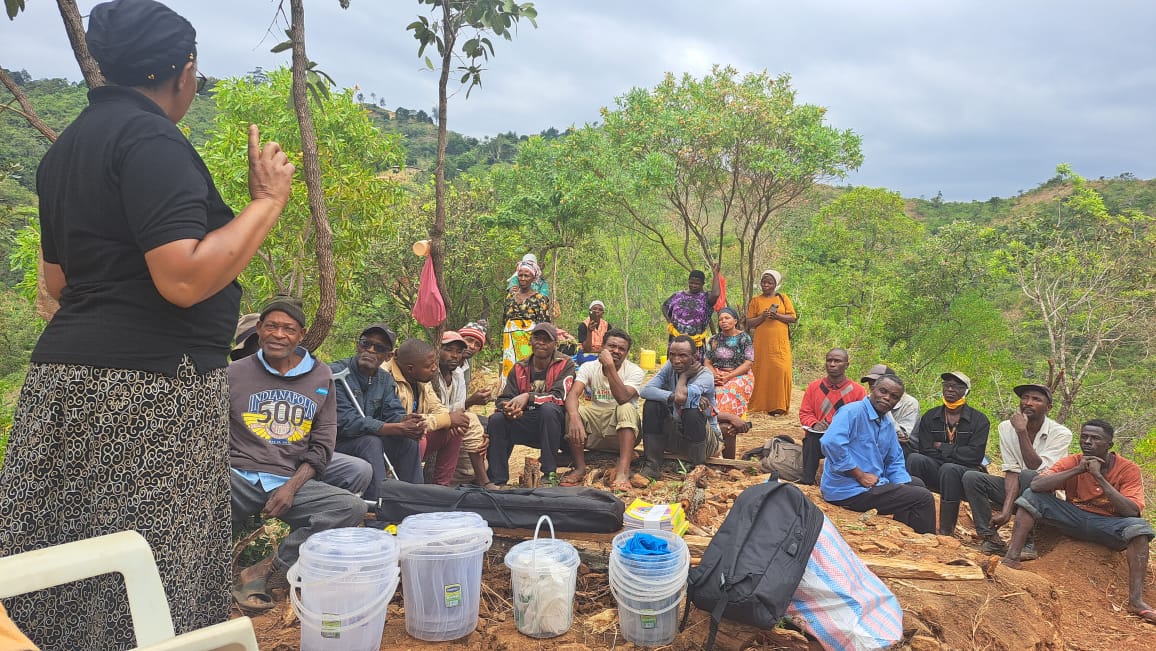
University of Nairobi (UoN)
Mushroom and Vegetable Farming to Improve Balanced Diets in Nomadic Communities
Kenya | Malnutrition & undernutrition | Nutrition security
In Kenya, low-income, pastoral households rely on staple diets consisting of milk and meat. Many cannot afford nutrient-dense foods, particularly during periods of drought and famine, leaving them with imbalanced and insufficient diets that result in rampant undernutrition and malnutrition. To address this problem, the University of Nairobi (UoN) proposes to supplement the imbalanced and insufficient diets of pastoral communities by growing low-cost mushroom and vegetables. Mushrooms are nutritious super foods packed with high protein, vitamins, and minerals. They are climate-resilient, are grown in areas and seasons when conventional crops are not viable and can reduce greenhouse gas emissions by up-taking carbon from agricultural waste. Compost resulting from mushroom cultivation will be used to fertilize the soil needed to grow other vegetables in vertical gardens established by the University of Nairobi. UoN will train pastoral women and students in mushroom and vegetable production, processing, and value addition into nutritious products. The team will also educate and encourage these target populations to use the fortified mushroom-vegetable products for household and school consumption and monitor its potential in reducing cases of under- and malnutrition.
NADA S.A.S.
Using Biotechnology and Education to Improve Wetlands and Reduce Disease Transmission
Colombia | Communicable diseases | Water-borne disease threats
The wetlands surrounding Cali, Colombia are negatively impacted by wastewater discharge, lack of public services and government support, and the effects of climate change. These conditions contribute to eutrophication (a depletion of oxygen in the water), resulting in poor air and water quality, which increases the risk of air- and water-borne diseases. NADA’s innovation aims to address water contamination and oxygen depletion in the wetlands by implementing Phytocore biotechnology, which uses an engineered type of algae to metabolize organic waste in bodies of water. This innovation aims to reduce oxygen depletion and improve air and water quality.
North West University
Air Quality and Pollen Density Map for Supporting Respiratory Health
South Africa | Respiratory illness | Air quality
In South Africa, climate change has caused significant shifts in precipitation patterns. There has been an increase in frost-free days, as well as higher seasonal air temperatures, resulting in a shift in pollen seasons. This innovation by North West University seeks to develop an air quality-allergy risk map for the Vaal Triangle, a hotspot of air pollution in South Africa. The air quality map will address the impact of pollen on allergies, asthma symptoms, and overall human health by allowing individuals and pharmaceutical companies to prepare for high pollen conditions. The map is intended to be used by governments and NGOs to help prevent and manage respiratory disease, improve health and better plan for agricultural changes.
Carleton University
Infectious Diseases Treatment Module for the Treatment of Climate Change-Related Outbreaks
Canada | Communicable diseases | Vector-borne disease threats
The effects of climate change not only exacerbate the spread of infectious diseases, but also create challenging conditions to contain outbreaks and deliver appropriate healthcare. In partnership with the World Food Programme and the World Health Organization Technical Science for Health Network (Téchne), the project team has designed an Infectious Diseases Treatment Module (IDTM), a structure which can be rapidly and easily deployed, transported, and operated within 4 hours of arriving on site, regardless of the disease or environmental conditions. The module’s structure is designed to respond to outbreaks, offering shelter to healthcare providers and patients despite harsh and extreme weather.
The team will refine, evaluate and work to improve the ‘transfer screen’ of the IDTM while also exploring the use of the screen as a stand-alone item in existing built environments (e.g., warehouses) for communities that may not require the entire IDTM kit. The project team will also complete the WHO KPI IDTC Framework to help evaluate the performance of the IDTM and its components, for use by community partners to assess infectious disease treatment centres in real-world outbreaks.
University of Witwatersrand
Performance and Creative Arts for Children’s Environmental Empowerment
South Africa | Communicable diseases | Vector-borne disease threats
In South Africa, the mental health challenges of marginalized communities have been magnified by extreme climate events and the COVID-19 pandemic. The University of Witwatersrand’s Drama for Life project will use creative and expressive arts to foster children’s self-expression, support mental wellness, and promote connection in schools. Drama for Life’s therapists and interns will facilitate classroom workshops and after-school Eco-Drama clubs that organize engagement in climate action and empower children to participate in local environmental issues. The program aims to develop children’s eco-resilience through reconnection, care, and mindfulness.
University of Cape Coast
Reducing the Effects of Poor Air Quality on Street Vendors’ Health Using Antioxidant-Rich Foods
Ghana | Respiratory illness | Air quality
In Ghana, air quality is negatively impacted by climate change, resulting in worsened respiratory and cardiovascular health. Street vendors, often exposed to poor air quality for long periods due to the nature of their occupation, face significant health risks. However, current advisories for mitigating air pollution health effects only take on mitigation and avoidance-based approaches. The University of Cape Coast aims to implement and test a nutritional intervention which provides street vendors with antioxidant-rich foods such as sunflower oil, peanuts, oatmeal, and eggs. The goal of the intervention is to reduce the health effects of air pollution and deliver education on the importance of antioxidant-rich foods. The University of Cape Coast will also create a food environment map with locations of fruits and vegetable stalls and deliver educational programming on how to implement home gardening to increase accessibility to antioxidant-rich foods in target communities.
College of Medicine of the University of Ibadan
Improving Farmers’ Mental Health and Wellbeing Through Climate Change Education
Nigeria | Mental & psychological health | Extreme weather
Farming practices in Nigeria have been disrupted in recent years by extreme weather variability, resulting in varying levels of economic losses and unemployment. As a result, climate change-related social and economic stresses present an increased risk of depression and suicide. The College of Medicine of the University of Ibadan seeks to address these risks by distributing informational resources on climate change and supporting mental health through activities and meetings hosted at the Agricultural Development Farmers Association (ADFA). During bi-weekly meetings, older farmers will be educated on creating awareness on local climate action and environmental conservation initiatives, mental health risks and warning signs, physical health checks, and more.
Integrated Youth Empowerment Centre (IYEC)
SAFEWATERS: Promotion of water and sanitation at community level
Cameroon | Communicable diseases | Water security (quantity and quality)
The rise in heatwaves and extreme temperatures caused by climate change in Cameroon accelerate the spread of water-borne disease, such as cholera and typhoid, transmitted by drinking and recreational water use. The Integrated Youth Employment Centre (IYEC) aims to establish multiple Integrated Water Infrastructures (IWIs) to improve the quality and quantity of affordable drinking water using tanks and biofilters. IYEC will take a community-based approach with this innovation, establishing a Water Management Committee run by locals in the community to harbor information on water resources and community water needs. Through their innovation, IYEC hopes to educate and improve water quality for thousands of community members.
African Applied Chemical (Pty) Ltd.
Next-Generation Long-Lasting Insecticide Treated Nets to Prevent the Spread of Malaria
South Africa | Communicable diseases | Vector-borne disease threats
Since 2016, insecticide-resistant mosquitoes have contributed to an increase in malaria cases in sub-Saharan Africa. Additionally, climate change-driven warming temperatures are causing a further resurgence in malaria. Long-Lasting Insecticide Treated Nets (LLINs) have long been the main mosquito population suppression method. However, as mosquitoes become increasingly resistant to the type of insecticide used, the efficacy of LLINs decreases. To address this challenge, Africa Applied Chemicals will produce and test NoBuzz®, a next-generation, washable mosquito net designed to be effective against resistant mosquitoes by using an engineered fibre, using AAC’s innovative Bi-Ko™ slow-release technology, that slowly and continuously releases insecticide. Following production, the team seeks to demonstrate that NoBuzz® is very effective against moderately and highly resistant mosquito strains under laboratory conditions and is able to meet strict WHO standards.
Rescue Connect Limited
Integrating the Effects of Climate and Weather Data into Neonatal Emergency Response
Kenya | Heat-related illness | Heat stress
Climate change has increased global temperatures, resulting in rising cases of heat stress and malaria in Kenya, which increase the risk of preterm and stillbirths for pregnant women. Rescue Connect Limited’s Rescue.co seeks to address the impact of heat stress on maternal and neonatal health in Kenya by adding an intelligence layer to its existing emergency dispatch platform — Computer Aided Dispatch (CAD) Flare — by integrating Tomorrow.io’s Africa-specific weather application programming interfaces (APIs). With this integration, Rescue.co’s emergency platform will include real-time weather data in addition to its existing obstetric emergency cases, traffic, and facility information data, which will all serve to better assist emergency dispatchers when responding to emergency maternal and neonatal health cases. In addition to testing and assessing the integration, the team will analyze data available on heat-related weather indicators and obstetric cases to identify trends that could assist in providing new or improved services to minimize the rate of calls.
Fondation Ouedraogo Hamade De Ramesse (FOHR)
Combatting Food Insecurity by Using Solar Power to Harvest Mayflies
Burkina Faso | Malnutrition & undernutrition | Nutrition security
Climate change-driven drought, scarce rainfall, and flooding create difficult environmental conditions. In Burkina Faso, these weather events have contributed to a drop in crop yields, which have led to an increase in overall malnutrition in the population. Fondation Ouedraogo Hamade De Ramesse (FOHR) seeks to address this by capturing mayflies, a traditionally edible insect with already high nutritional value, using novel solar-powered techniques that don’t require rainfall. FOHR hopes that this innovation will increase the availability of mayflies as a staple nutritional source to combat mal- and under-nutrition in Burkina Faso.
Kenya Industrial Research and Development Institute (KIRDI)
Cultivating Ecologically-Dependant Species Together to Increase Nutrition
Kenya | Malnutrition & undernutrition | Nutrition security
As climate change increases the unpredictable and severe nature of droughts and floods, decreasing fishing and agricultural yields, Kenya’s rural communities are becoming progressively at risk for food insecurity and malnutrition. The Kenya Industrial Research and Development Institute (KIRDI) provides a diet-based solution to malnutrition that leverages various levels of the food chain to boost the consumption of nutritious foods. KIRDI will test their innovation model which farms multiple ecologically inter-dependent species in an inclusive and resilient food productive system. By working with local farmers, KIRDI aims to mitigate the effects of climate change on food production by providing multiple harvesting streams, as well as supporting the income of smallholder farmers through high production of seaweed, fish, and rice.
GEOTEK WATER SOLUTIONS LTD.
Geotek’s Community-Led Water Resilience: A Solar-Powered Handpump Monitoring System
Nigeria | Communicable diseases | Water security (quantity & quality)
Geotek Water Solutions Ltd has developed Geotek Monitor, a solar-powered handpump borehole monitoring sensor and accompanying mobile app, to improve water quality in Nigeria. Geotek aims to equip local NGOs and community members with the skills and knowledge required for the maintenance and testing of these monitors. The sensor collects real-time data on the water availability, quality, and functionality of handpump boreholes. Through this innovation, Geotek Water Solutions Ltd hopes to establish a sustainable framework by empowering communities to take collective ownership of their water supply. The Geotek Monitor is expected to enhance water resilience, quantity, and reduces health risks associated with water-borne illness from poor quality water.
Cameroon Youth School Tech Incubator (CAYSTI)
Application mobile pour accroître l’utilisation des aliments indigènes et l’éducation nutritionnelle au Cameroun
Cameroon | Malnutrition & undernutrition | Food security
In Cameroon, the diversity of food production and consumption is increasingly at risk as climate change causes debilitating droughts. Food production diversity is hugely important to overall nutrition, especially for the prevention of malnutrition in food insecure areas. To combat malnutrition, CAYSTI is developing a smart mobile app to educate local populations on underrepresented, nutrient-dense foods that are locally available and low-cost to source. The 3-in-1 app makes information readily available in local languages to the general public and nutrition professionals alike, including recipes, personalized recommendations, and multimedia nutrition educational content.
Tamil Nadu Agricultural University
Studying and cultivating climate-resilient crops to Improve nutritional security
India | Malnutrition & undernutrition | Food security
In India, severe climate and weather events have resulted in a reduction in food quantity and nutritional quality, leading to an increase in cases of severe acute malnutrition among other health issues. The research team at Tamil Nadu Agricultural University aims to address malnutrition and the most common nutritional deficiencies through the development of underutilized, climate resilient, and nutrient-rich traditional crops for future climatic scenarios. Subsequently, the team aims to develop and test fortified food products from these crops, including millet flakes, baby food, and cookies.
Purpose Health Care Africa
Preventing the spread of water-borne disease with community-led education groups
Uganda | Communicable diseases | Water-borne disease threats
Heavy rains caused by climate change exacerbate the spread of waterborne diseases in Uganda, especially in densely populated slums in Kampala. Purpose Health Care Africa’s innovation is based on the Household Cluster-Health Education Model, which organizes households into clusters of 10 and assigns them each a Health Education Volunteer that is a member of the community. These volunteers will provide education on the health impacts of climate change, disease prevention, and the dangers of poor waste management to foster behaviour change.
The University of Glasgow
Development of a low-cost schistosomiasis rapid test
Kenya | Communicable diseases | Water-borne disease threats
The prevalence of schistosomiasis, a parasitic disease transmitted by flatworms in freshwater, is increasing due to climate change-enabled flooding and high temperatures in Kenya. In response, the project team seeks to develop a rapid test to detect DNA biomarkers for parasitic flatworms (Schistosoma mansoni and Schistosoma haematobium) from a finger prick of blood. Unlike current testing methods, which require urine or stool samples, the test is cost-effective, quick to administer, and easy to distribute. The innovation will be implemented with the help of “citizen scientists,” a team of community health workers that recruit participants and instruct them on testing, prevention and treatment of schistosomiasis.
University of the Witwatersrand
Implementing an early warning system for the prevention of malaria outbreaks
Democratic Republic of the Congo, South Africa | Communicable diseases | Vector-borne disease threats
Extreme weather events alongside increasing rainfall patterns and global temperatures are affecting malaria across sub-Saharan Africa. This innovation aims to develop and demonstrate the feasibility of an early warning system for malaria outbreaks in the Democratic Republic of the Congo and South Africa. This solution will employ a web application with a user-friendly interface with the aim to provide an early warning system and forecasting for national malaria campaign programmes to strengthen model-based disease surveillance for forecasting outbreaks. The project team will work with political and community-based stakeholders to demonstrate the value of the early warning system, gathering their input on how to best use the system throughout the app’s design and development processes to ensure it is informed by those who will use and benefit from it.
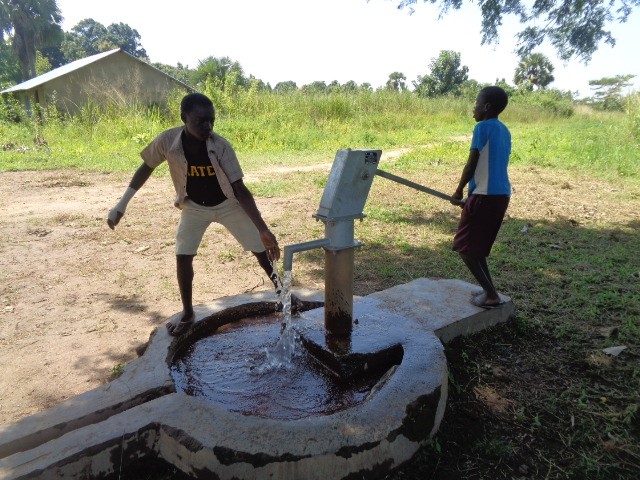
Youth Empowerment and Development Aid (YEDA)
Community water supply scheme to improve health and wellbeing
South Sudan | Communicable diseases | Water-borne disease threats
In Mundri West County, South Sudan, heavy rainfalls caused by climate change have destroyed water, sanitation and hygiene (WASH) infrastructures, worsening access to safe drinking water and increasing water-borne diseases. In these low-income rural communities constructing a traditional water system has a high cost, usually recovered through the management costs collected from the local community, which limits the possibility for local institutions to manage it afterwards. To address these issues, Youth Empowerment and Development Aid (YEDA) will develop and test a community-centered and solar-powered water supply system designed jointly by local communities and trained water technicians and build 4 sanitation facilities with hand-washing stations. These interventions will be paired with community capacity building to manage such infrastructures in the future, as well as hygiene promotion sessions to promote behavioural change for safe use of water and safe sanitation. The community will play an active role in water management by planning, mobilizing resources, and constructing the project alongside local authorities.
